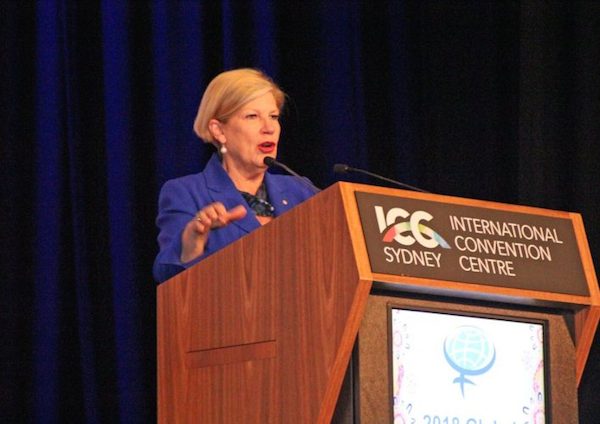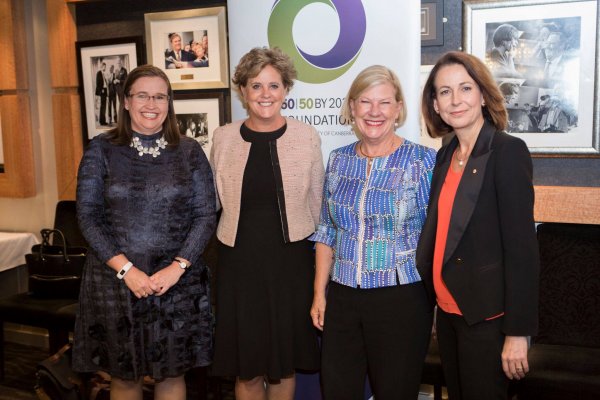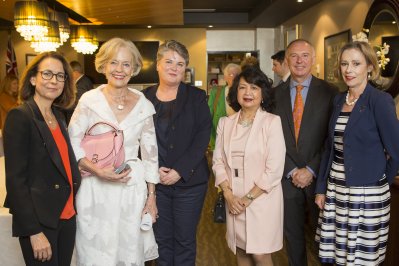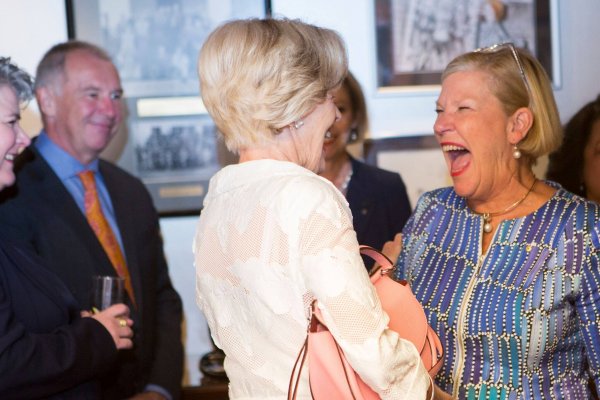Q1. Why is the Global Summit of Women important? Why do we need it?
It’s a good question because I would’ve hoped that we wouldn’t need it by now. The reason we need it is because there’s still a lot of issues that women young and old, from different countries around the world are grappling with, so it’s a great opportunity to hear speakers, to mix with women from other cultures and countries, who are dealing with perhaps similar issues in different ways, and to learn new strategies to try and accelerate the equality in both business and workplaces and in other parts of lives of women around the world.

Ann Sherry, Chairman of Carnival Australia welcomes participants to the 2018 Summit. Image: Global Summit of Women
Q2. World Economic Forum describes women’s participation as an urgent issue, fundamental to economic prosperity. Where should we focus our efforts now, what are the most pressing issues in Australia?
I think the pressing issues in Australia are on a number of levels. So one is inside organisations, despite having good policies and practices women aren’t treated equally, and that’s particularly true around maternity. Even though there’s good policies, the practices don’t often match what’s said.
The second obvious area is that there’s a lot of chitchat about flexibility, but most workplaces operate very 1950s working structures and hours, and that disadvantages women indirectly. The issues around harassment, and what’s called these days ‘everyday sexism’ are still rampant, and for women in many workplaces it puts them off, and locks them out. And when we look at the senior executive ranks in Australia, there’s still hardly any women.
…most workplaces operate very 1950s working structures and hours, and that disadvantages women indirectly
Q3. Irene Natividad has a very strong stance on quotas. But just recently we’ve witnessed backlash against diversity measures, and women copping the blame for the banking royal commission scandal. What’s your take on that?
I don’t accept that women have copped the blame for what’s happened. I think Catherine Brenner has paid quite a high price at AMP. I think lots of financial institutions have found the one or two women in their executive ranks and have put them forward, because they think that it’s going to be a better look, and that the women will be more empathetic in the face of the questioning. The reality is that in all of the financial institutions that have appeared, the people running the pieces of the business that are called to question, are all men – irrespective of who stands up in the box. So the idea that women been blamed – I don’t think that’s true, but I think that lots of institutions have put women forward and that’s game playing.
Those issues are cultural, they’re not individual, and they need to be fixed
Some people have said that the AMP is in trouble because of quotas, that’s not true either, and the fact that there happens to be a female chair at AMP, one of the few, is coincidence, not designed. And also, there was quite a good piece written about Catherine Brenner and David Gonski, and of course nobody’s suggesting that he got where he did because of quota system, even though her career and his are absolutely paralleled. I think there’s a degree of convenience at the moment, that this is about women, not about poor practices, poor governance and whether men or women are at the head of these organisations. Those issues are cultural, they’re not individual, and they need to be fixed.

Kate Jenkins, Sex Discrimination Commissioner; Her Excellency Menna Rawlings, British High Commissioner to Australia; Ann Sherry AO, Co-Chair Global Summit of Women Host Committee; Virginia Haussegger AM, Dir 50/50 by 2030 Foundation
Q4. In terms of the government – in 2014 when Australia hosted G20 in Brisbane, the then Minister for Women said quite empathetically that ‘this government does not support quotas’ – has the mood shifted on this?
Certainly the mood’s changed among women, partly because it’s too slow, nothing’s happening. So if the current system is not working, let’s try something else! I mean in no other part of business would just say ‘it’s not working, well let’s just keep doing it’, you’d say ‘well what else could we do?’ How do we get more change, and how do we drive the powers faster, and the current government, their performance even with women who stand for election, is terrible, relative to the ALP who do have a quota system.
So if you’re looking for comparatives, we might do well to look at the political system where one side’s got quotas and ensuring women get preselection, and the other side doesn’t. And the other side’s got almost half their MPs are female, and the other side has a tiny proportion, so there’s a bit of convenience in some of these arguments.
But we do need to speed up the pace of change – and quotas is one way of doing that
But we do need to speed up the pace of change – and quotas is one way of doing that, and therefore I’m in favour of them as well. We’ve spent the last 30 years saying time will fix it, and now we’ve got more women graduating from universities, more women coming into organisations, women doing better in small and medium businesses, and in all these other domains women are doing better than men – except in the corporate hierarchy.
 (Photo by Hilary Wardhaugh: Virginia Haussegger, Dame Quentin Bryce; Fran Murphy; Irene Natividad; Gordon de Brouwer; Carmel McGregor)
(Photo by Hilary Wardhaugh: Virginia Haussegger, Dame Quentin Bryce; Fran Murphy; Irene Natividad; Gordon de Brouwer; Carmel McGregor)
 (Photo by Hilary Wardhaugh: Dame Quentin Bryce, honoured with the Global Summit’ Women’s Leadership Award)
(Photo by Hilary Wardhaugh: Dame Quentin Bryce, honoured with the Global Summit’ Women’s Leadership Award)
Q5. What role do women play in improving the current situation?
I’m of the view now that women need to keep advocating for themselves, but then also, we need a bit more action from men – because men still hold most of the power, and unless they’re prepared to stand up and say ‘this isn’t right’, then we need to have more people talking about it, not just women talking about it for themselves. Women still need to advocate and be articulate about what’s working and what’s not working for them in workplaces, but we need more men involved in the discussion, and particularly men who are willing to advocate for women, and make change.

Q6. What was your key takeaway from the Summit this year?
In some areas, where the pace of change is really slow, women are finding other ways, and this is the power of social media. I use the example of #MeToo, or #NOWAustralia, and I’ve been saying to corporations as well, with impatience comes a risk for companies that not enough is happening, and those companies need to be thinking a bit harder about their positioning, because they run the risk of being the next front page, or the next group of organisations that are publicly named and shamed. That sort of risk is not insignificant, and women are getting more impatient, so let’s find a way of moving this debate forward, or there will be more of that. There’ll be more women verbalising frustrations, there’ll be more women who just go ‘this is what happened to me and nobody fixed it’ and so on.
So there’s a risk for companies who do nothing now and that’s quite a big change because we’ve been very polite to date. Most women have said that we’ll work through the system and we’ll trust that what people say is what’s going to happen that they’ll be responsive to our needs and so on and so on, but there’s a limit to how long everyone is willing to sit around waiting for that to happen. So that’s one of my take aways, there’s lots of interesting discussions going on, and lots of issues were canvassed, but the biggest shift is that women are more impatient.
But it’s not a pipeline problem, it’s bias in decision-making that’s locking women out, not that there aren’t any women
Q7. Are there any practical things we can do, how do we make sure these lessons and messages are implemented?
The groups such as ‘Male champions of change’, having men on the stage was quite a good message. It was interesting to watch that as a dynamic, and the women in the audience asking hard, hard questions. I mean in some ways it’s turning up the heat. I’m encouraging people to be more impatient. Don’t just bitch to your friends, do something about it. Be louder. And there used to be a saying a hundred years ago, don’t be too polite girls, and I’m encouraging that again because I think we’ve toed the party line, we’ve been very polite, not too outrageous, and everyone’s saying ‘we don’t want quotas’, and now I think everyone’s saying ‘actually, we said we didn’t want quotas but now that nobody’s done anything, we do’. But it’s not a pipeline problem, it’s bias in decision-making that’s locking women out, not that there aren’t any women.
I’m encouraging people to be more impatient … Be louder
Q8. Anything else you’d like to add?
There’s such value having women cross-culturally attend. We brought women in from the Pacific, and of course in the Pacific islands, they barely have any women in parliament, PNG has no women in parliament. Women in those cultures and countries where there’s such systemic bias against women, often dressed up as culture, they a) felt like they were welcomed, and they often don’t feel like that, and b) they said that there’s lots of good ideas, this was fantastic, it was like a shot in the arm to help us go back and work out what we’re going to do next. I think that cross-cultural conversation, the ideas that we take for granted here that we can implement, they’re not ideas that are floating around all over the world, and so the energy those women take home shouldn’t be downplayed because there’s a great power to that.

Switzerland announced as the host of the 2019 summit. Image: Global Summit of Women




